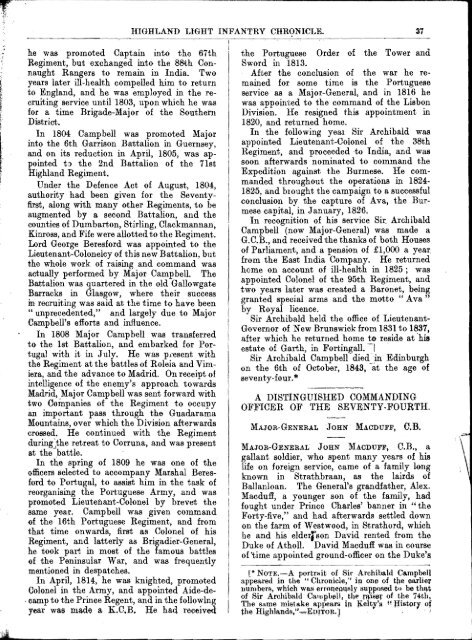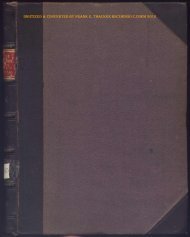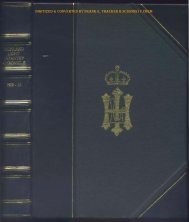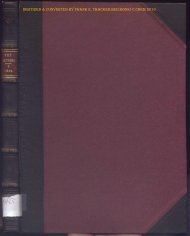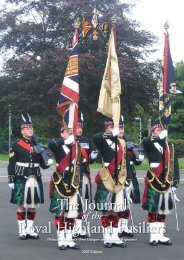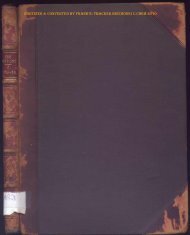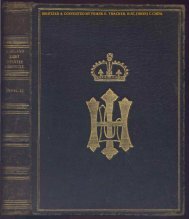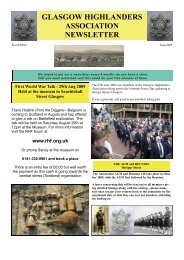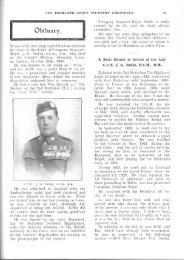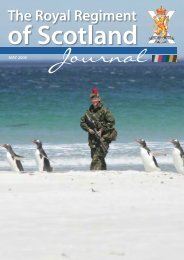HLI Chronicle 1910 - The Royal Highland Fusiliers
HLI Chronicle 1910 - The Royal Highland Fusiliers
HLI Chronicle 1910 - The Royal Highland Fusiliers
- No tags were found...
You also want an ePaper? Increase the reach of your titles
YUMPU automatically turns print PDFs into web optimized ePapers that Google loves.
HIGHLAND LIGHT INFANTRY<br />
37<br />
he ~as promoted Captain into the 67th<br />
RegIment, but exchanged into the 88th Connaught<br />
Rangers to remain in India. Two<br />
years later ill-health compelled him to return<br />
to ~~gland, ,and he was employed in the recrUltmg<br />
,servIce until 1803, upon which he was<br />
fo: Il; tIme Brigade-~1ajor of the Southern<br />
DIstrIct.<br />
. In 1804 Camp bell was promoted Major<br />
mto the. 6th Garr~son Battalion in Guernsey,<br />
an~ on Its reductIOn in April, 1805, was appomted<br />
t) the 2nd Battalion of the 7lst<br />
<strong>Highland</strong> Regiment.<br />
Und~r the Defence Act of August, 1804,<br />
authonty ha~ been given for the Seventyfirst,<br />
along WIth many other Regiments, to be<br />
augm~nted by a second Battalion, and the<br />
c0.untles of Du:ubarton, Stirling, Clackmannan,<br />
Kmross, and FIfe were allotted to the Regiment.<br />
~rd George Beresford was appointed to the<br />
Lleutenant-Colonelcy of this new Battalion, but<br />
the whole work of raising and command was<br />
actually performed by Major Camp bell <strong>The</strong><br />
Battalion ~as quartered in the old Gall~wgate<br />
Barracks m Glasgow, where their success<br />
in recruiting was said at the time to have been<br />
"unprecedented," and largely due to Major<br />
Campbell's efiorts and influence.<br />
In 1808 Major Campbell was transferred<br />
to the 1st Battalion, and embarked for Portugal<br />
w~th it in July. He was pLesent with<br />
the Reglffient at the battles of Roleia and Vim<br />
~era, ~d the advance to Madrid. On receipt of<br />
mtell~gence .of the enemy's approach towards<br />
MadIld"MaJor Campbell was sent forward with<br />
two. Companies of the Regiment to occupy<br />
an Important pass through the Guadarama<br />
Mountains, over which the Division afterwards<br />
crossed. He continued with the Regiment<br />
during)he retreat to Corruna, and was present<br />
at the battle.<br />
In the spring of 1809 he was one of the<br />
officers selected to accompany Marshal Beresford<br />
to Portugal, to assist him in the task of<br />
reorganising . the Portuguese Army, and was<br />
promoted Lieutenant-Colonel by brevet the<br />
same year. Camp bell was given command<br />
of the 16th Portuguese Regiment, and from<br />
that time onwards, first as Colonel of his<br />
Regiment, and latterly as Brigadier-General<br />
he took part in most of the famous battle~<br />
of the Peninsular War, and was frequently<br />
mentioned in despatches.<br />
In Ap~il, 1814, he was knighted, promoted<br />
Colonel ID the Army, and appointed Aide-de<br />
. camp to the Prince Regent, and in the followIng<br />
year was madf.) a K.C.B. Re had received<br />
the Portuguesc Order of the Tower and<br />
Sword in 1813.<br />
After the conclusion of the war he rema~ed<br />
for so~e time is the Portuguese<br />
serViCe as a Major-General, and in 1816 he<br />
was appointed to the command of the Lisbon<br />
Division. He resigned this appointment in<br />
1820, and returned home .<br />
In the following yeaI Sir Archibald was<br />
appointed Lieutenant-Colonel of the 38th<br />
Regiment, and proceeded to India, and was<br />
soon afterwards nominated to command the<br />
Expedition against the Burmese. He commanded<br />
throughout the operations ill 1824<br />
1825, and brought the campaign to a successful<br />
conclusio~ by the capture of A va, the Burmese<br />
capItal, in January, 1826.<br />
In recognition of his service Sir, Archibald<br />
Camp bell (now ~Iajor-General) was made a<br />
G.C.B., and received the thanks of both Houses<br />
of Parliament, and a pension of £1,000 a year<br />
from the East India Company. He returned<br />
home on account of ill-health in 1825' was<br />
appointed Colonel of the 95th Regiment, and<br />
two years la~er was created a Baronet, being<br />
granted speCial arms and the motto " A va "<br />
by <strong>Royal</strong> licence.<br />
Sir Archibald held the office of Lieutenant<br />
Governor of New Brunswick from 1831 to 1837<br />
after which he returned home to reside at 'hi~<br />
estate of Garth, in Fortingall.-I<br />
Sir Archibald Campbell died in Edinburgh<br />
on the 6th of October, 1843, -at the age of<br />
seventy-four.*<br />
A DISTINGUISHED COMMANDING<br />
OFFICER OF THE SEVENTY-FOURTH.<br />
MAJOR-GENERAL JOHN MACDUFF, C,B.<br />
MAJOR-GENERAL JOHN MACDUFF, C.B., a<br />
~allant sol~ier, wh~ spent many years of his<br />
hfe on f~relgn serViCe, came of a family long<br />
known m Strathbraan, as the lairds of<br />
Ballanloan. <strong>The</strong> General's grandfather, Alex.<br />
Macdufi, a youI.1ger son of the family, had<br />
fought under Prmce Charles' banner in "the<br />
Forty-five," and had afterwards settled down<br />
on the farm of Westwood, in Strathord which<br />
he and his elderfson David rented fr~m the<br />
Duke of Atholl. David Macdufi was in course<br />
of ' time appointed ground-officer on the Duke's<br />
[" NOTE.-A portr>lit of Sir Archibald Campbell<br />
appeared in .the "<strong>Chronicle</strong>," in one of the earlier<br />
lIUIDerS, which was erroqeQQsly supposed ti. be that<br />
of Sir Archiald Call1vbell. the miser of the Uti;,<br />
<strong>The</strong> same mistake appears in 'f{.elty'~ H History of<br />
the <strong>Highland</strong>s,"~EolTOR.J .... I


